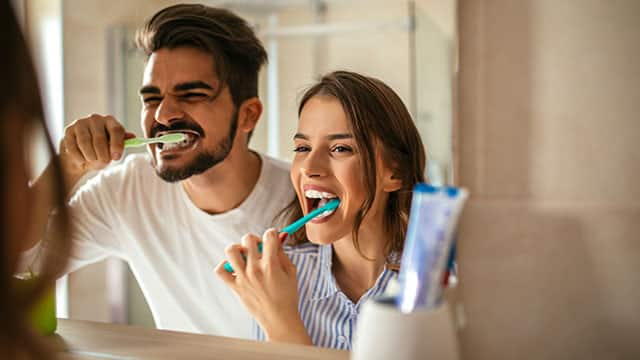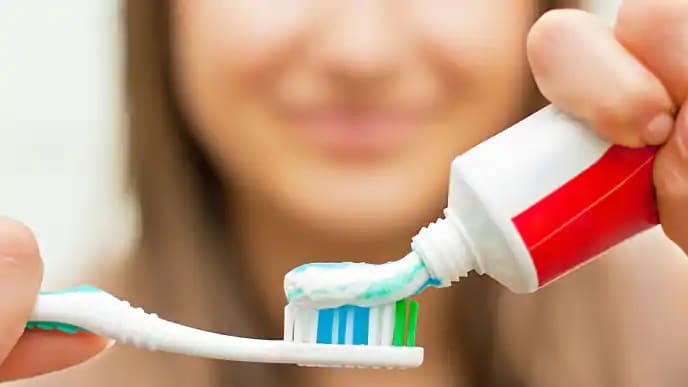Risks of Over Brushing Your Teeth
Over-brushing your teeth not only refers to "how much" you brush your teeth but also "how" you brush them. Compulsive or over-vigorous brushing can lead to oral health problems and put your mouth at risk for dental abrasion, tooth sensitivity, and gum recession.
Toothbrush Abrasion
Dental abrasion refers to the loss of tooth structure by mechanical forces from a foreign object, according to the Herman Ostrow School of Dentistry of USC. In this case, the enthusiastic use of your toothbrush wears away at the tooth enamel and, eventually, the softer dentin and cementum structures. You can identify abrasion as worn, shiny, and often yellow or brown spots on the tooth near the gumline. Notching — a wedge or V-shaped indention of the tooth along the gumline — is also a sign of abrasion.
Tooth Sensitivity
When toothbrush abrasion wears away the tooth enamel, the dentin layer's nerve endings either become exposed or close enough to the surface to lead to tooth sensitivity. This sensitivity may cause you to feel discomfort or pain when your teeth are exposed to hot, cold, sweet, or sour stimuli or when you brush your teeth.
Gum Recession
Continued overzealous and improper brushing may also cause your gums to recede. When this happens, the softer cementum of the root is exposed and vulnerable. Not only is exposed cementum easily worn away and notched, leading to sensitivity and pain, but it's also more at risk for decay.
Treatments to Protect Teeth After Over Brushing
If left untreated, dental abrasion and gum recession may lead to cavities and even tooth loss. To address toothbrush abrasion and tooth sensitivity, your dentist may recommend treatments to protect the tooth and cover up the exposed dentin. These treatments might include using a fluoride varnish to strengthen the teeth' surface, bonding a tooth-colored filling over the abraded area, or covering the exposed surface with a veneer. If over brushing has caused your gums to recede, they may never come back to the point where they were. You might require gum grafting surgery to replace the missing gum tissue and protect the exposed cementum in some cases.
Prevention Through Proper Brushing Technique and Tools
The good news is that preventing over brushing is as simple as adopting the proper teeth brushing technique and tools. Start here:
- Use a soft-bristled toothbrush. You may think stiff bristles will do a better job of cleaning your teeth. Still, they increase your chances of dental abrasion and gum recession.
- Check your toothpaste. Toothpaste with high abrasive agents can also accelerate the process of tooth loss. Instead, look for a toothpaste that's rich in calcium and fluoride to help strengthen your tooth enamel.
- Use the proper technique. Want to know if you're brushing too hard? Check your toothbrush. If the bristles become flattened and frayed within a couple of weeks, you might be using too much pressure. Try using this brushing technique instead.
- Don't brush right after eating. Wait at least 60 minutes after eating or drinking to brush your teeth, especially if you have consumed something acidic like lemons or soda. Instead, drink water or chew sugarless gum to freshen your breath while you're waiting.
- Check your other habits. Over-brushing isn't the only cause of abrasion. Suppose you have the habit of opening bottles with your teeth, holding nails or pins in your mouth, or biting your fingernails. In that case, those activities could also cause dental abrasion or even a broken tooth. Lip or tongue piercings can also wear away at your enamel.
Just remember, if you're looking for a spotless smile, over brushing is not your answer. When you use the appropriate tools and implement a gentle but thorough brushing technique, you'll win the race for clean teeth and a healthy mouth every time.
This article is intended to promote understanding of and knowledge about general oral health topics. It is not intended to be a substitute for professional advice, diagnosis or treatment. Always seek the advice of your dentist or other qualified healthcare provider with any questions you may have regarding a medical condition or treatment.
ORAL HEALTH QUIZ
What's behind your smile?
Take our Oral Health assessment to get the most from your oral care routine
ORAL HEALTH QUIZ
What's behind your smile?
Take our Oral Health assessment to get the most from your oral care routine















